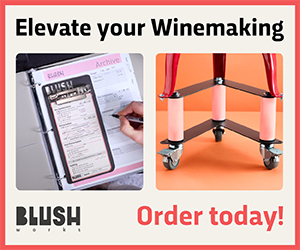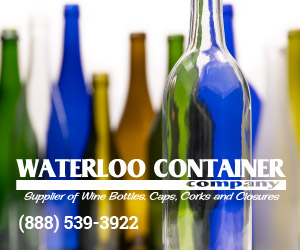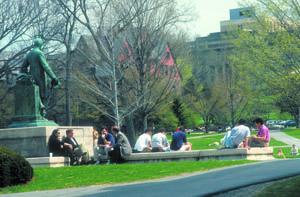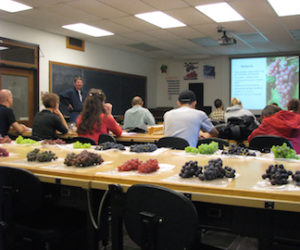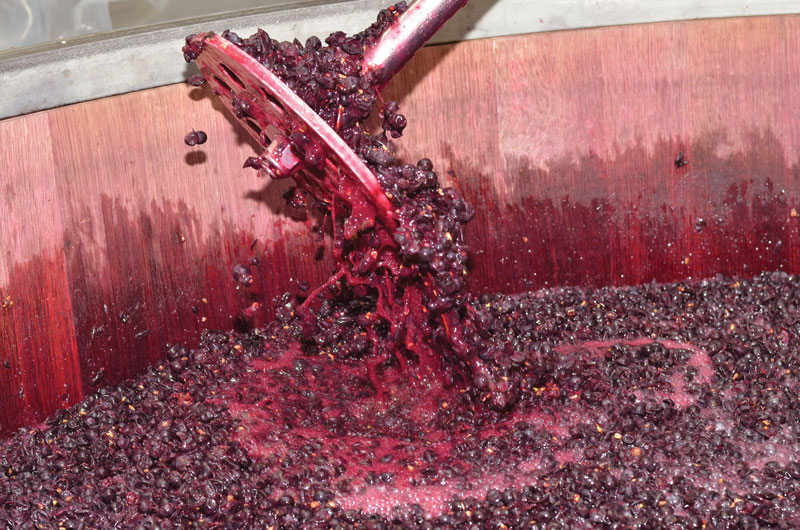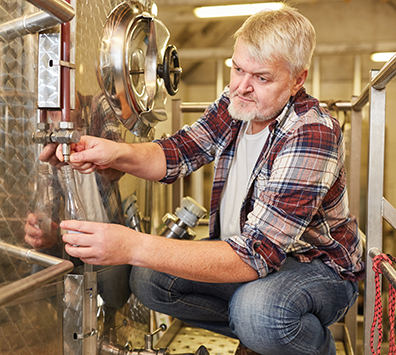
It is very clear that once you catch the winemaking bug you cannot help but think about being a full-time winemaker or owning your own winery. Wine is the best combination of art, science, and community. How could you not daydream about going from home winemaker to pro?
If you are serious about making the move to professional winemaker, I have some tips and suggestions to get you ready for the transition along with some case studies of people who made the jump from hobbyist to full-time winemaker.
Winemaking Skills
Going from making 6 gallons (23 L) to larger, commercial-sized production can be challenging. The equipment, the nutrient additions, and so on can be confusing at that scale and attention to detail is key. Before jumping into the pro winemaker role it is important to hone your skills as best you can. You can do this in several different ways.
• Focus on the skills wineries are looking for in a head winemaker.

Reading the job descriptions on Winejobs.com helps give you an idea on what to focus on and where you can grow your skill set.
• Volunteer or intern at a winery.
Volunteering at a winery will give you some of the best experiences that you cannot learn in school. You can volunteer in the vineyard, as a cellar hand, in the winery lab, in the tasting room, event department, or doing any other odd jobs one of your local wineries could use some help with. Volunteer anywhere you can to get your foot in the door. No matter where you start you will have access to a wealth of information and real-world experience — take advantage of it.
Pro Tip: Usually the smaller the winery, the better the experience. This is because in smaller businesses people wear a lot of hats. You will be involved in multiple aspects of winemaking and will get a more in-depth winemaking experience.
• Go to a young wine region.
If you can travel for harvest or live in a small winemaking region then you are in luck. Working in a small or young wine region allows for a wealth of winemaking and wine growing experience. Everyone is learning and experimenting in these areas. Mistakes are a given, and everyone is learning from each other and harvest time is full of creativity.
• Experiment with home batches.
Experimentation is key. The more you learn, the better! Many people play it safe to avoid making mistakes. In winemaking, knowing how to correct mistakes is one of, if not the, most powerful tool in your toolbox. Wine is a living, breathing thing. You never know what will happen year-to-year so you need to be ready for anything. The best winemakers I know have made some of the most colossal mistakes and are better for it. The more you experiment, mess up, correct, and learn, the better a professional winemaker you are going to be. And getting this learning experience at the relatively low-risk time as a home winemaker will benefit you greatly vs. learning on the fly in a commercial setting.
When going up for a winemaking position, owners and head winemakers like to see what types of winemaking you have been exposed to. Not every winery solely makes dry wines. Lots of wineries make sweet wines, sparkling wines, and fruit wines. The more wines you have tried to create, the more exposure you have and the more knowledge you have obtained. Experimenting will help you learn how to make different wines and be ready for whatever your first winemaking job throws at you.
• Explore your palate.
You must be very careful and make sure to avoid cellar palate as a winemaker. Cellar palate is when your wine palate gets used to only one style of wine and therefore cannot be judgmental of wine quality. You want to be able to taste wine and pick out if it is balanced, flawed, and complex.
Taste, taste, and taste away! Try everything. Red wine, white wine, fruit wine, sparkling wine, vegetable wine, sake, mead — try it all! The more your palate is exposed to the better you will be at identifying positive components in wine.
Faults and flaws will always be present in winemaking. Taking a class, tasting, and smelling faulted and flawed wine helps train you for what you should avoid. If you know the smell of rotten eggs means hydrogen sulfide issues you can be quick to correct it with di-ammonium phosphate (DAP) before it develops into a worse problem. This skill will keep you from losing batches, and money.
• Consume Content.
There are so many resources out there now. Consume as much wine and winemaking content as you can. It serves as education, inspiration, and exposes you to all facets of the industry. A good professional winemaker understands the business of wine. Below is a list of resources I’d personally recommend, but there are many more as well. Soak it all up!
Get in the Know
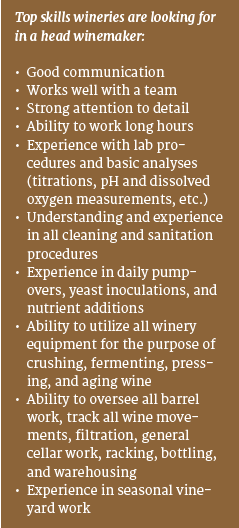
Outside of building up your winemaking abilities, there are some more areas to focus on if you want to make a career out of this hobby.
• Network.
Networking is a great way to get your foot in the door. The wine community is very small and inviting. Everyone in the industry is passionate and wants to see others succeed. The mindset is that the more you succeed, the more I will succeed too. Ways to network are via trade shows, classes you take, wine events, social media, winery visits, winemaking groups, online seminars, and forums.
• The Business of Wine.
As a home winemaker you have the luxury to make any wine you choose. However, once you get a commercial winemaking job you are no longer making wine for you. You are making wine for the public. You have got to get in tune with what they like as your wines will need to appeal to the masses. This may include sweet wines, wines infused with fruits, and other popular styles. When making the move from home winemaker to pro, research and see what is selling best in the area you hope to secure a job. Remember that your paycheck is not the only one that matters. If you are a professional winemaker, you are making wine to be sold to support your salary and the salary of everyone else who works there.
Brush up on legal requirements for the state in which you will be working. Sulfites, blend percentages, sweetening, labeling, local vs. nonlocal grapes/juices, etc. There are different wine regulations for each state and sometimes the county. Being armed with this information will show that you are committed and serious about a head winemaking position.
You will need to keep a budget. One of the key things that sets a head winemaker apart from an assistant winemaker or cellar hand is the ability to budget your winemaking. Be ready to keep track of costs and everything that goes into that bottle and if/where you can save money. Wineries are notorious for being money pits. Any way you can help the bottom line will give you an edge over other winemakers going up for the job.
• Have Confidence in Your abilities.
Do not forget your wine experience when applying for a job. You bring something special to the table. Your story, how you fell in love with wine, how you got started out in the winemaking hobby. Talk about those special moments. Think about what your winemaking point of view is. Is it all about experimentation? Place? History? Specific styles? What gets you excited about winemaking? Try to find a producer that is in line with you and then go for it! Reach out to them, offer your services, and get that winemaking job!
Case Studies
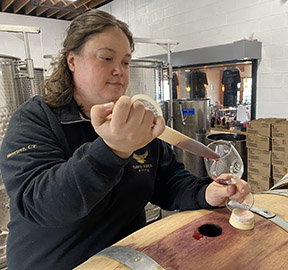
Maureen Macdonald
Hospitality to Head Winemaker
Maureen started in the hospitality industry and created her own winemaking curriculum while working multiple jobs. She was an Assistant Manager at a restaurant and worked in a winery tasting room part-time. Through the help of her mentor she was able to piece together classes via University of Connecticut, Naugatuck Community College, and Capitol Community College in Connecticut. Once she finished her education, she got the job as Head Winemaker at Cassidy Hill Vineyards in Coventry, Connecticut. From there she moved on to work with Musto Wine Grape Company as the Head of Winemaking Consulting and Education, and now is the Head Winemaker at Hawk Ridge Winery in Watertown, Connecticut.
Maureen advises that, “Even if you do not have access to a direct program — try to find an expert in the area who you can mentor with and piece together what you can. It is all about who you know. Show the mentors that you are serious and opportunities will open up to you.”
Maureen said there was a learning curve when she started getting into commercial winemaking in many areas, including some in which she hadn’t considered previously. One example is the way in which wine must be stabilized to withstand poor treatment after it is bottled and out the door — which may not be something home winemakers have to worry about as their wines are generally staying in their own possession.
“The learning curve with understanding that you don’t have control over how your wine is stored once it is purchased is a big factor. You do not have control over how that wine is going to be stored and you need to take extra precautions to stabilize that wine. You need to prepare that wine to face the worst. Whereas a home winemaker, you can use less sulfite, etc. Get familiar with heat stability and cold stability tests to make sure that wine is stable going into that bottle,” she said.
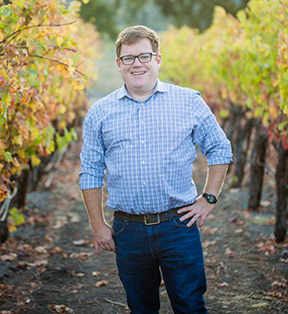
Sandy Robertson
Insurance Agent to Consulting
Winemaker and Wine Brand Owner
Sandy went back to school at age 26 after a career in insurance to study winemaking at Plumpton College in England. Growing up in Hong Kong he had always wanted to be a farmer. He even worked on an ostrich farm in New Zealand when he was 18 years old. The farming aspect of wine is what drew him into the industry, and he has never looked back. The Plumpton program consisted of one year of viticulture study, one year of enology, and a third year focused on lab study. He liked this program because it was very hands-on. He related it to Fresno State’s program in California. And when he wasn’t in classes, Sandy tried to get as much experience in the industry as he could.
“During every school holiday, I either worked at a different vineyard, winery, or judged at the International Wine and Spirits Competition,” Sandy said.
After receiving his degree, Sandy got a full-time job as an enologist at Merry Edwards Winery in Sebastopol, California in 2007. Now he consults wineries in Northern California and around the U.S., while making wine for the wine label he started with his wife Erin, Dogwood & Thistle Wine Company, in California’s Napa Valley.
Although winemaking wasn’t his first career, Sandy says it feels like a natural fit now. “If you are starting this career later in life keep making wine at home. If you can, make more! Explore all aspects of the wine industry and make different wines. Go and do it! No matter your age,” he said.
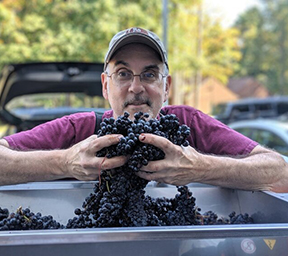
Frank Renaldi
Engineer to Consulting Winemaker (and when retired, full-time Winemaker)
Frank Renaldi started making wine 18 years ago. If you can believe it, he barely drank wine before he started making it. An engineer by day, Frank went from making wine the “old school Italian way” to now consulting for commercial wineries and helping home winemakers learn to make wine at WinemakingInstructions.com and Musto Wine Grape Company.
“When I started, I didn’t know the difference between a crusher and a press!” says Frank. What helped him the most was “understanding that in winemaking you can never stop learning.” Frank attended the WineMaker Magazine Conference five years straight, took Musto Wine Grape’s Bootcamp Class (which he now teaches), and read every book and
magazine he could get his hands on.
Frank’s biggest takeaways from his winemaking journey are “that you need to taste your wines and know what is right or wrong about them. You can never make good wine out of bad grapes. Try everything, experiment, and always take that class or seminar, you never know what you will learn.”
Even if winemaking would be your second or third career, there is always an opportunity available. Just because you did not go to UC-Davis and start right out of college, does not mean you cannot make it as a professional winemaker, as Frank can attest to.
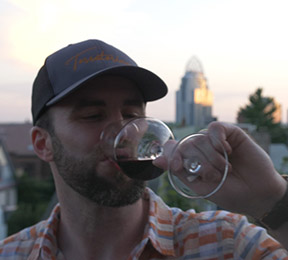
Ben Matthews
R&D Manager at P&G by day, Winemaker/Wine Brand Owner by night
Ben’s journey to winemaker started in Germany. He fell in love with Riesling while studying abroad in Mosel and Rheingau. He was blown away by the beautiful vineyards, history, and delicious wines.
When he got back to the U.S., he started researching the Cincinnati, Ohio wine industry and discovered that at one point it was the center of wine for the state of Ohio before Prohibition. Discovering the local wine history inspired him to plant a hobby vineyard and start making wine. After dabbling in winemaking for a few years, he stumbled upon Jim Duane’s winemaking podcast Inside Winemaking. He then flew to Napa and took Duane’s winemaking class, created a friendship with another harvest intern, Cameron Laurent, and now they all share a wine brand together – Terratorium Wines — as a side gig to his day job at Procter & Gamble.
Ben said that a big part of his winemaking success can be attributed to the fact that he authentically connected with people in the industry. “I connected with a lot of people on Instagram and through those online friendships I met the right people to help me to where I am today.”
“The best decision I ever made was to start at the smallest scale possible and from there take on one small chunk at a time,” he said.
After hearing about his trials and tribulations from home winemaker to where he is today, not to mention the amount of time and work that went into making that transition, I asked Ben if after everything he would do it all over again.
“Seeing people enjoy our wines is the greatest feeling; I would absolutely go through it all over again.”
Conclusion
Even if you hit some roadblocks, keep persevering. As we can see from these four pros, there are many ways to get to the finish line, and they don’t all require traditional routes.
Maybe you do not get a job right away, but maybe in the end you create your own wine brand, or something even better than you ever expected! No matter how you start out making wine; If you love wine, you will fit right in.
